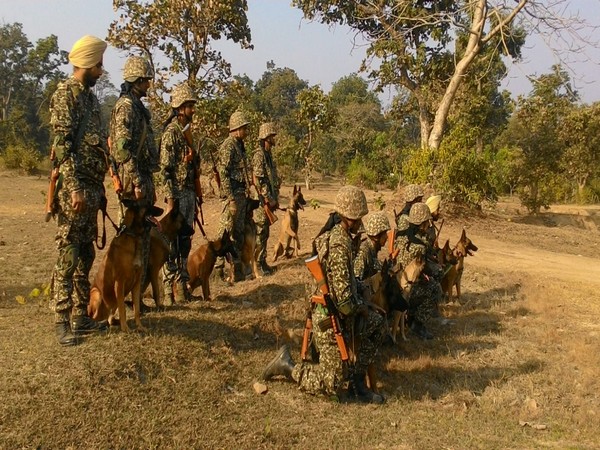Wildlife Sniffer Dog Force Gets Six New Recruits
India's Surveillance ToolsPosted by AI on 2025-09-08 06:49:12 | Last Updated by AI on 2025-09-08 23:36:03
Share: Facebook | Twitter | Whatsapp | Linkedin Visits: 0

India's wildlife protection ranks among the world's most at-risk and urgent matters. Today, six new German Shepherd dogs begin training to join India's wildlife sniffer dog force.
The illegal wildlife trade has endangered the existence of many wildlife species globally, and India is no exception. Rhino horn, tiger and leopard parts, elephant tusks, pangolin scales, and much more are all threatened. Wildlife law enforcement practices are crucial to containing this threat, and introducing a wildlife sniffer dog team for crime prevention and detection has been a game changer.
The six new German Shepherd dogs, ranging from six to nine months old, will be handling the highly skilled and sensitive task of detecting and curbing illegal wildlife trade in India. They will be trained to detect tiger and leopard skins, bear bile, and red sanders, among other illegal wildlife products.
This recruitment drives the total number of wildlife sniffer dogs trained under TRAFFIC and WWF-India's program to 94.
Dogs are competent in combating crimes of varied nature thanks to their agility and exceptional olfactory senses, making them perfect for this type of work.
With this new batch of six dogs, we are confident that they will continue to help enforcement officials curb illegal wildlife trade upon completion of their training.
Ravi Singh, Secretary General & CEO of WWF-India, acknowledges that using detection dogs in law enforcement is a proven practice, and TRAFFIC and WWF-India's wildlife sniffer dogs, popularly known as Super Sniffers, play a crucial role in detecting and curbing illegal wildlife trade in India.
ITBP issued a statement confirming that the 10th batch of six young German Shepherds dogs and their 12 handlers have begun their seven-month course at the National Training Centre for Dogs and Animals in Panchkula, Haryana.
This training program is designed to accommodate both basic obedience and detection skills specifically for detecting and curbing illegal wildlife trade in India. The dogs are being trained using the latest training tools to master sniffing and tracking skills for the scent of various wildlife products.
Upon completion of their training, the wildlife sniffer dog squads will join the forest departments of Karnataka (4), Bihar (1), and Madhya Pradesh (1).
Dr. Merwyn Fernandes, Coordinator of TRAFFIC's India office, commented that with just two wildlife sniffer dog squads in 2008, their program has successfully trained 88 dogs, with six more being trained as part of the 10th batch. Twenty-one states and union territories have participated in this program and deployed trained sniffer dog squads to fight against wildlife crime. The program has grown to become the largest in the country.
This latest drive to hire sniffer dogs is another positive step toward protecting India's precious wildlife.
testers, we are confident that these new wildlife sniffer dogs will continue to help the enforcement officials curb illegal wildlife trade upon completion of training," said Ishwar Singh Duhan, Inspector General, ITBP, and Director of NTCD&A.
Search
Categories
- Sports
- Business
- National
- Investments
- History
- Politics
- International
- Science & Technology
- Social Issues
- Disaster Management
- Current Affairs
- Events & Jobs
- మన పార్టీ
- మన నాయకత్వం
- మన విజయాలు
- డౌన్లోడ్స్
- మీడియా వనరులు
- కార్యకర్తలు
- రాజకీయం
- బిజినెస్
- సంపాదకీయం
- నవ్య
- చిత్ర జ్యోతి
- క్రీడలు
- జాతీయం
- తెలంగాణ
- తాజా వార్తలు
- Fast Check
- South
- Gallery
- Sunday Chronicle
- Hyderabad Chronicle
- Technology & Innovation
- Innovations and Initiatives
- బిజినెస్
- North East Skill Center News
- Government Schemes
- Entrepreneurship Support
- Employment Opportunities
- Skill Training Programs
- Education
- Startup Business
- Startup News
- Awards
- Community Services
- Fundraising Events
- Volunteer Services
- Health Initiatives
- సినిమా
- లైఫ్ స్టైల్
- క్రైం
- ట్రెండింగ్
- జాబ్స్
- అంతర్జాతీయo
- Market Buzz
- Awards
- Partners
- Products
- Press Releases
- News
- Departments
- Initiatives
- Resources
- Telangana IT Parks
- Press Releases
- News
- Airport News
- Sports
- Business
- Newtons Laws of Motion
- Karbonn in Business
- Investments in Karbonn
- Company quarterly sales
- Markets
- Auto News
- Industry
- Money
- Advertisements
- Stock target
- Company Updates
- Stock Market
- Company Sales
- Staffing and HR
- Constituency Assembly
- General News
- Srikalahasti Temple
- Bojjala Sudhir Reddy
- Products
- Industries
- Services & Trainings
- Tools & Resources
- Technology Integration
- Drug Seizures & Arrests
- Telangana Narcotics
- Law & Enforcement
- Rehabilitation
- Nationwide Drug Policing
- Nigeria Seizures
- Global Operations
- Drug Awareness
- Drug Enforcement Tech
- NCB Drug Seizures
- Judicial Crackdown
- India's Surveillance Tools
- Cross-Border Links
- Women Safety
- Cyber Crimes
- Drug Abuse
- Traffic & Road Safety
- Community Connect
- Public Safety Alerts
- Citizen Assistance
- Nellore City News
- Politics & Administration
- Events & Festivals
- Agriculture & Rural
- Business & Economy
- Health & Wellness
Recent News
- Hyderabad: Two Men Losing Rs 1.65 Crore Highlights Surging Online Fraud Cases
- Hyderabad Police Arrests Three in Digital Arrest Fraud Case
- Settlement Rejected, Judge Cites 'Absurdity' in $1.5B Pirated Books Case
- UK to cajole migrant-refusing nations with visa suspension threat
- Minister Promises to Complete Medical Colleges Under PPP Model
- headline RO Water Plants Inquiry Sought for Citizen Health Protection
- Tragic Deadliest Toll Plaza Collision Kills 3 and Critically Injures 2 in Andhra Pradesh
- Nellore- a district of religious harmony and vibrant culture